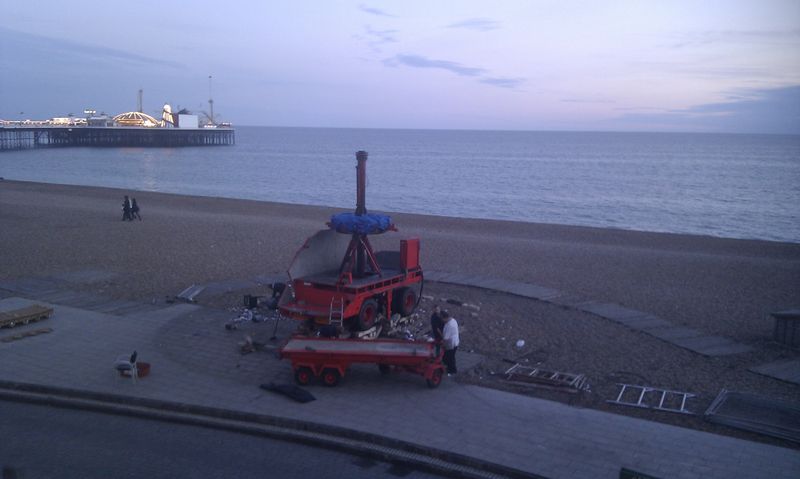This was originally performed as a spoken word piece at the ArtistsModelsInk event Life Cycles, on October 3rd 2011.
There are, in fact, two Brightons, a summer town and a winter town. The streets might look the same, but everyone knows deep down that Brighton is a different place in summer than it is in winter.
The winter Brighton is cold and mean. The wind whips straight off the sea, cruel and unrelenting. Brighton becomes a place of buildings and rooms as people spend as little time as possible in the streets. Lives become smaller as the days grow shorter. In shared student houses, communal rooms are abandoned to the cold, and some people resort to evenings spent lying directly in front of their heaters. The winters’ nights can be so bitter that you feel alone, even when sharing your bed with another body.
Brighton began as a winter town. Even in its occasional prosperity, it was a town of mean, tumbly cottages, of fishermen whose fate was, most likely, to be claimed by storms at sea. Brighton’s fortunes ebbed and flowed until the Great Storm of 1703 “stript a great many houses, turn’d up the lead of the church, overthrew two wind-mills, and laid them flat on the ground, the town in general (at the approach of daylight) looking as though it had been bombarded.”
Two years later, the winter town drew down another storm. Brighton suffered greatly, its buildings destroyed and shingle flung over the wreckage. Few people responded to a national appeal to pay for sea defences. Daniel Defoe claimed that the cost of saving the town was more than the town was worth. It appeared that the winter town had destroyed itself.
But Brighton’s fortunes are ever-changing. In 1750, Dr. Richard Russell published his dissertation De Tabe Glandulari, promoting the healing powers of the Brighton waters. Patients were ordered to swim in the sea and drink its brine – for many years, the rooms in the Grand Hotel had a third tap for sea-water. With the seawater cures came the season, an act of magic that gave birth to Brighton’s summer town, pushing the winter town into retreat.
Winter is still hard here. The wind still howls and waves still crash against the shore. The staff at the pier’s pizza-stand huddle close to the oven, taking turns to lean against it, sometimes melting the plastic logos on the back of their uniforms. People can freeze to death on these streets. When it snows, ice makes the steep streets of Hanover treacherous. And more: a dark secret, known to only a few, there are hideous things in the waves near our town and, during the winter, they come closer to the surface.
But these days, no matter how deep the winter, it always ends. The watery daylight of winter’s days is replaced by something stronger. The Carousel is removed from its canvas wrappings and restored to the seafront. Brighton becomes a town of ice-cream alchemists and chance meetings, where plans are abandoned after finding old friends. Where entire days can be scattered on the pebbles, lying on the beach to watch far-off jets sketch contrails across blue skies.
The winter town can never last too long now.
But I want more than this. No more hiding in rattle-windowed rooms ever, wishing the wind would stop. No more lying against plug-in radiators, praying for warmth. I want a Brighton where it is summer forever, where the cold never gets a firm grip.
I want a New Brighton, and a New Hove, for the old Brighton and Hove to be passed away. A place where nobody is ever bored; where there is a Temple of the Sun, translucent concrete and Hotels of Strangers. Where timber is thrown off ships to make a wood slick every January, and people marvel at the piles of planks on the pebbles. A town where there is no sign banning sleeping in the pavilion gardens; where seagulls never shriek. A place where hangovers are outlawed and you can drink all night and never feel ill.
I want a new Brighton and a New Hove, to see the Winter town banished so that teeth never chatter and nobody shivers unless they want to. A town where summer lasts forever and never grows dull.
